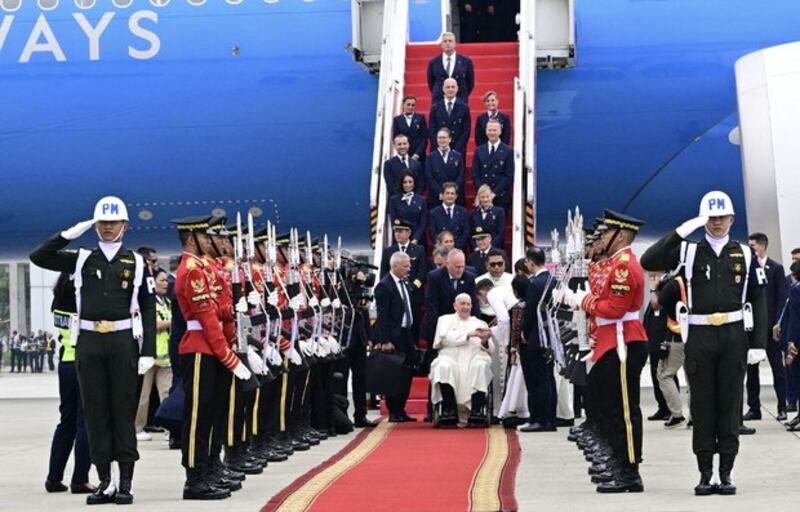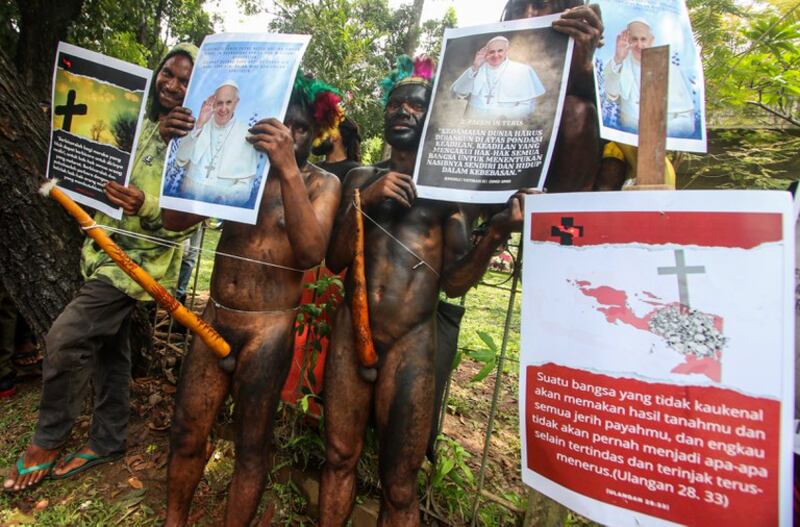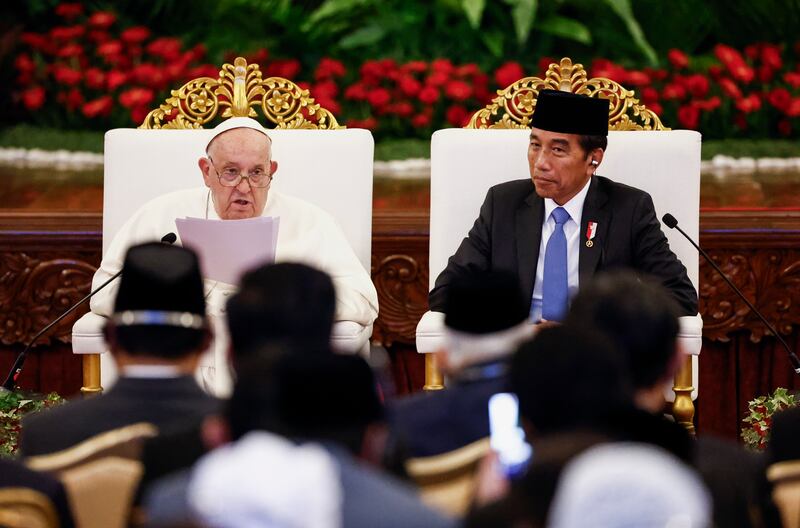Hundreds of indigenous Papuans staged protests on Wednesday to highlight ongoing violence and displacement in the conflict-torn Papua region as Pope Francis met with Indonesian President Joko “Jokowi” Widodo.
Francis arrived in Jakarta on Tuesday, marking the beginning of a tour of Southeast Asia and Oceania, which includes visits to Papua New Guinea, Timor-Leste and Singapore.

He is due to meet with Catholics from Indonesia’s Papuan provinces on the PNG leg of his trip, when he visits the border town of Vanimo.
For Amnesty International, the papal visit represents an opportunity to press the Indonesian government to address human rights abuses in Papua and reconsider development policies that harm local communities.
Francis said the Catholic Church was committed to increasing interreligious dialogue to foster peace and address ongoing imbalances and suffering in parts of Indonesia.
“In this way, prejudices can be eliminated, and a climate of mutual respect and trust can grow,” he said on Wednesday.
In the capital Jakarta, demonstrators gathered outside the Vatican embassy, holding posters of Francis.
“This action aims to welcome Pope Francis to Indonesia while also expressing the concerns of Catholics and indigenous people in Papua regarding the violence still occurring there,” said Jeno Dogomo, a Papuan student in Jakarta.
“People in nine Papua regencies have been displaced. The Pope should be able to see this,” Dogomo said.

Hundreds of protesters in Jayapura and Timika, two main cities in Papua, participated in a peaceful "Way of the Cross" procession. Dressed in black to symbolize mourning, they marched under police supervision after brief negotiations allowed the event to proceed.
“We explained that this was not a protest but a prayer procession,” said John Bunay, one of the rally participants. “Eventually, the police allowed it to continue.”
The latest U.N. Human Rights Committee report on Indonesia in March raised concerns about allegations of extrajudicial killing, excessive use of force and enforced disappearances involving indigenous Papuans. The U.N. High Commissioner for Human Rights has been unable to arrange a visit since being invited in 2019.
Also known as West Papua, it was officially integrated into Indonesia in 1969 following the controversial “Act of Free Choice,” a referendum that saw just over 1,000 Papuans vote unanimously in favour under a heavy military presence.
Since the disputed result, the region has been gripped by conflict between Indonesian security forces and insurgents, with frequent reports of human rights abuses.
Despite government efforts to develop the region economically, many Papuans continue to push for self-determination, citing decades of discrimination, military violence, and exploitation of their natural resources.
“The pope's message of peace and dialogue is especially timely in light of the ongoing violence in Papua,” said Usman Hamid, Amnesty International’s Indonesia director.
Amnesty said it had recorded 132 cases of extrajudicial and unlawful killings resulting in at least 242 civilian deaths in Papua between February 2018 and August 2024.
“Militarization and suppression of dissent have led to a humanitarian crisis with many civilian casualties and widespread displacement,” Usman said.
Francis’ trip, from September 3 to 13, represents his longest foreign tour as the leader of the Catholic Church and his first visit to Southeast Asia.
The pope’s Indonesian itinerary includes a mass at the national stadium on Thursday, with 85,000 Catholics expected to attend, and an interfaith gathering at Istiqlal Mosque, the largest mosque in Southeast Asia.

Speaking to an audience that included President Jokowi, senior officials and diplomats at the presidential palace, Francis praised Indonesia’s efforts to maintain national cohesion while warning against rising extremism and intolerance globally.
“The mutual respect for the cultural, ethnic, linguistic, and religious characteristics of all groups in Indonesia is the unifying fabric that makes Indonesians a united and proud people,” Francis said, invoking Indonesia’s national motto, Bhinneka Tunggal Ika (Unity in Diversity).
Indonesia, a sprawling archipelago of more than 17,000 islands that declared independence in 1945, has been tested by rising religious intolerance and political polarization in recent years.
Catholics make up about 3 percent of Indonesia’s 270 million people, with Protestants accounting for 7 percent.
In his remarks, Jokowi emphasized the importance of celebrating differences.
“For Indonesia, differences are a gift, and tolerance is the fertilizer for unity and peace as a nation,” said the President.
“It is this spirit of peace and tolerance that Indonesia and the Vatican want to spread amidst a turbulent world,” he said, highlighting the ongoing Israeli-Palestinian conflict.
